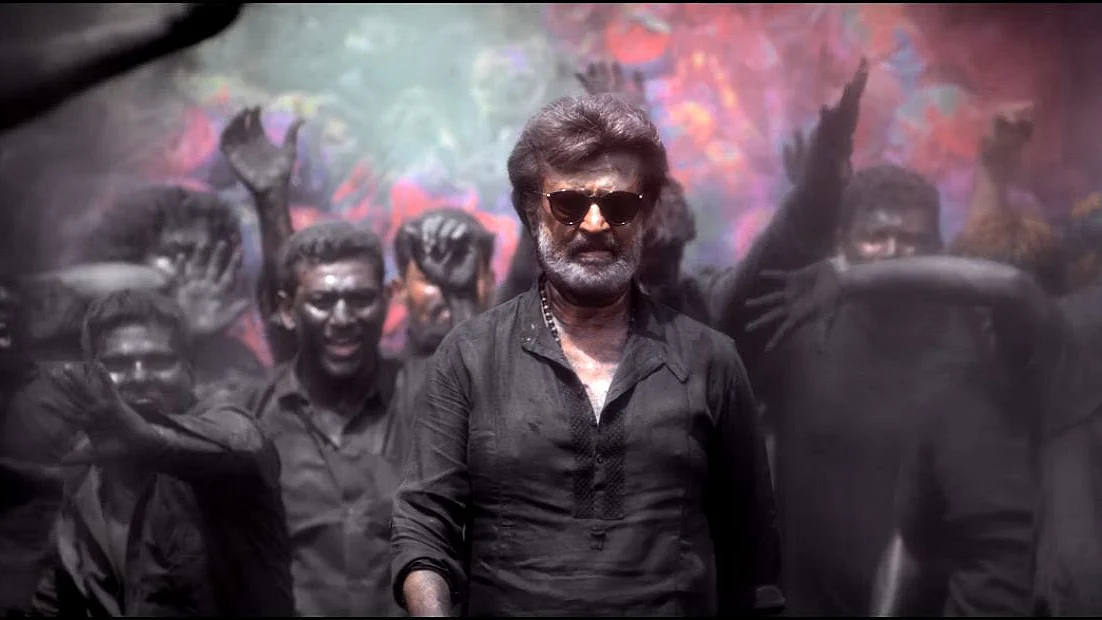Rajinikanth-starrer Kaala takes Hindutva by its horns
<i>Kaala</i> speaks the kind of politics that Rajinikanth perhaps finds averse. While he exerts his people to protest for their land in <i>Kaala</i>, he has said more than once that protests affect development

Right from naming it Kaala, director Ranjit begins breaking the clichés that have always defined Tamil cinema. Kaala in Tamil means black. It’s also the name of Yama, the God of Death in Hindu mythology. Yet in the film, Kaala is a saviour, someone who stands up against the upper class/upper caste attempts to appropriate the land from the oppressed.
Perhaps the biggest cliché that the film breaks is that of Rajinikanth.
Somewhere after 1980s, Rajinikanth stopped acting in films that gave him scope to perform and started doing superstar roles. Kaala sets it right. In Kaala, Rajinikanth is not the hero who goes about bashing the villains, he doesn’t utter punch dialogues, and no he doesn’t talk down to women. In fact, in Kaala, women emerge as significantly powerful characters. They are not the ones who cry in shame when stripped by a cop. Pualu aka Charumathi (played by Anjali Patil) picks up a stick instead of her pants to hit them back. After preaching about how women should behave in film after film, Rajinikanth in Kaala tells the protestors not to hand over the task of cooking to women. Men are seen chopping vegetables at the protest site in the next scene. In Kaala, the rediscovered Rajinikanth is a pure delight to watch.
By portraying the struggle of inhabitants of Dharavi to retain their right over their land, Kaala speaks up for the countless urban poor whose struggles for land have hardly been portrayed in the mainstream. Kaala is political in more than one way. While espousing the cause of urban poor, Kaala also appropriately takes on the Hindutva by its horns – something that has left the BJP leaders squirming in Tamil Nadu.
Kaala is carefully constructed by imageries that are unabashedly political. For example, antagonist Haridev Abhyankar (played by an impeccable Nana Patekar) is a chitpavan Brahmin – the community to which VD Savarkar – the Hindutva ideologue - belonged. Pitting the black clad Kaala against the white-clad, cleanliness-obsessed (he is the brain behind Clean Mumbai campaign) Haridev Abhyankar, Ranjit perhaps seeks to lay bare the inherent contradictions and the threats it poses to the livelihoods of the poor in such campaigns. If Mumbai has to be cleaned, Dharavi has to be revamped. If Dharavi has to be revamped, its countless inhabitants stand to lose their homes.
By portraying the struggle of inhabitants of Dharavi to retain their right over their land, Kaala speaks up for the countless urban poor whose struggles for land have hardly been portrayed in the mainstream. Kaala is political in more than one way. While espousing the cause of urban poor, Kaala also appropriately takes on the Hindutva by its horns – something that has left the BJP leaders squirming in Tamil Nadu.
Films that have a semblance of rationalism and independence have long remained the pet peeves of the BJP. From Padmaavat to Veer Di Wedding, the Hindutva supporters have raised their arms in protest even before the films were released, even before they knew of its content.
In Tamil, actor Vijay’s Mersal ran into controversy because of a dialogue that talked about GST and Demonitisation. While the BJP went to town with its opposition against the single dialogue, they continue to remain tight-lipped about Kaala – that has anti-Hindutva imageries lined up from the beginning till the end.
Right from the medley of colours in climax – significantly black, red and blue (against saffron) – breaking on screen in celebration of winning the land, to the end credits which has surnames dropped even for renowned actors including Nana Patekar and Huma Qureshi, Kaala speaks its mind. Yet for the BJP, which thinks that it has found a political ally in Rajinikanth, speaking against Kaala could be suicidal. Some leaders have even said that it’s a film and should be treated as one.
Kaala also lays bare the conflict called Rajinikanth. Kaala speaks the kind of politics that Rajinikanth perhaps finds averse. While he exerts his people to protest for their land in Kaala, Rajinikanth has said on more than one occasion that protests affect development.
For the BJP, that has always found difficult to break any ground in Tamil Nadu, Rajinikanth is a newfound hope. Sources say the BJP hopes to strike an alliance with the yet to be launched political party of Rajinikanth which will help them break the tough terrain of Tamil Nadu. That perhaps explains their silence over a film like Kaala.
But what still remains a million dollar question is the challenge now faced by Rajinikanth. Perhaps for the first time, the actor has made it clear that he is not what he appears on screen. Can the cinema-driven state accept this contradiction?
Follow us on: Facebook, Twitter, Google News, Instagram
Join our official telegram channel (@nationalherald) and stay updated with the latest headlines
